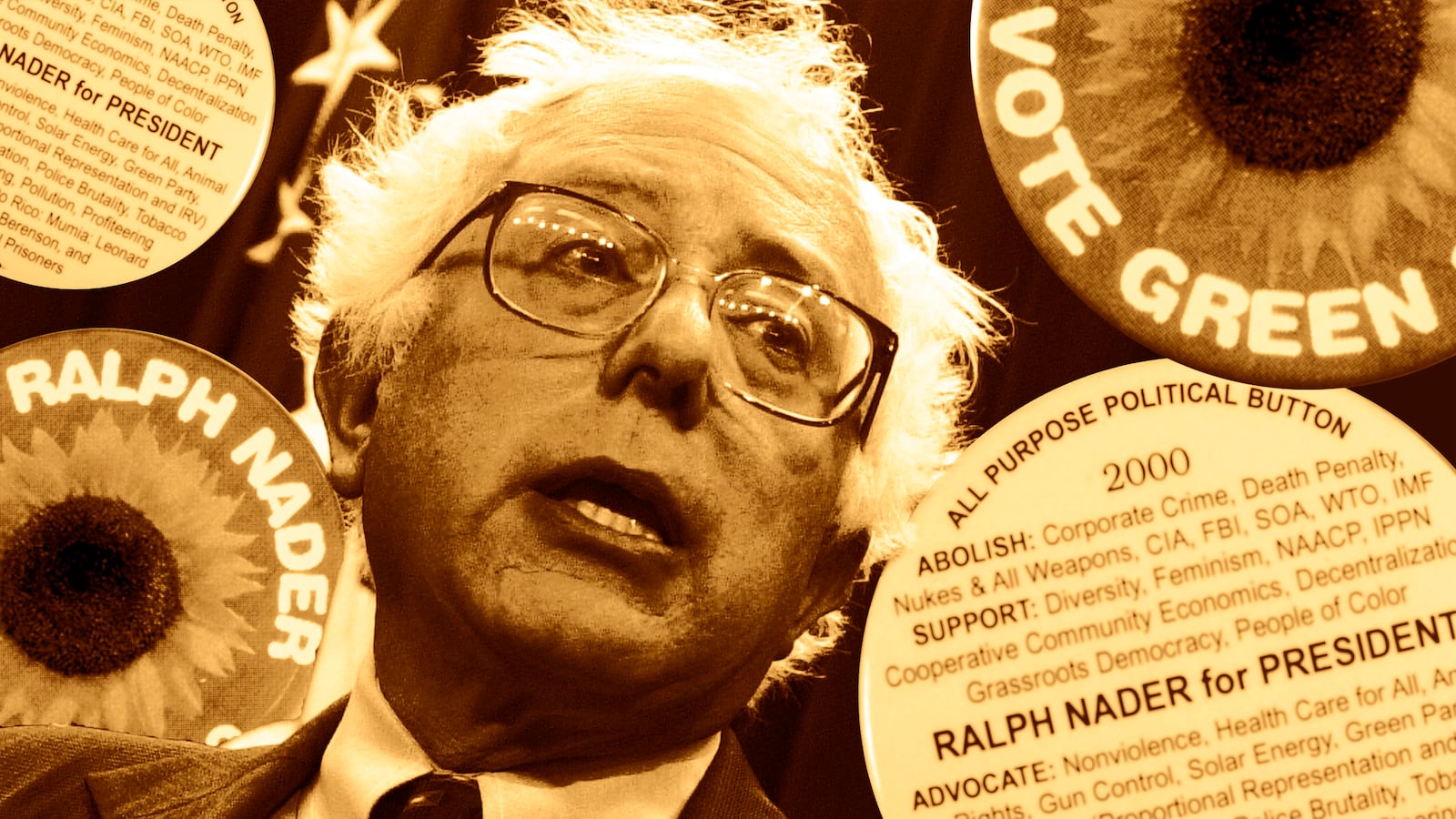After getting knocked back on his heels on Super Tuesday by an Avengers-style crossover event of Democratic moderates joining forces to back former Vice President Joe Biden’s campaign for the nomination, Sen. Bernie Sanders needs all the friends, surrogates and high-profile supporters he can get.
Among Sanders’ 25 former rivals for the Democratic nomination, however, only New York City Mayor Bill de Blasio and Marianne Williamson have endorsed his candidacy—and fellow progressive Sen. Elizabeth Warren told reporters on Thursday that she is in no rush to throw her influential support behind either Sanders or Biden.
But at least one former presidential hopeful has answered the call to back Sanders’ campaign: consumer advocate and Democratic bête noire Ralph Nader.
In a series of tweets on Wednesday, Nader declared that “the state and federal Democratic machines” were in cahoots to screw Sanders out of the nomination, “immolating themselves with a bumbling, war-mongering Wall Street toady.”
“Biden is the triple BBB candidate,” Nader tweeted on Wednesday night. “The Big Business-War Machine Biden. He’s carried water for big banks, credit card companies against student loans. He ran with corporate trade deals emptying out jobs in America's heartland. He covers for Delaware’s notorious corporate havens.”
Nader has also written numerous op-eds in support of Sanders’ candidacy, calling the fixation on electability “just another name for the self-compromised Democratic Party's defeatism and cowardliness.”
For many Democrats, Nader is still one of the more reviled political candidates in recent memory for playing, they believe, the role of spoiler in the 2000 presidential campaign that resulted in the election of President George W. Bush. Nearly 2.9 million people voted for Nader that cycle, including nearly 100,000 in Florida, where the official margin of Bush’s Electoral College-winning victory was a mere 537 votes.
Nader, for his part, has long denied playing the role of spoiler—but at the time of his then-fourth campaign for the White House, at least one Democrat-aligned politician was happy to give the Green Party nominee a boost: then-Congressman Bernie Sanders.
Nader had few friends in 2000, but Sanders was one of them. Over the course of the 2000 campaign, Sanders introduced Nader at campaign events, played coy about voting for him, and frequently implied that there was little difference between what he saw as the pro-corporate leadership of the Democratic and Republican parties, and that for progressives, Nader presented an appealing protest candidate.
“I applaud Ralph Nader for running the most vigorous Independent progressive campaign probably in 60 or 70 years—and he is raising the right issues,” Sanders told NPR’s Juan Williams in late October 2000, two weeks before the election. “I think progressives are going to have a difficult choice to make because of those two realities.”
In that conversation, one of many exploring Sanders’ history with Nader resurfaced by CNN’s KFile last summer, Sanders, who caucuses with the Democrats in Congress but was an independent until recently, refused to say at the time whether he would vote for Nader or then-Vice President Al Gore, the Democratic nominee.
“I’ll keep that to me when I walk into the voting booth,” Sanders said, later noting that “I happen to agree with virtually everything [Nader] says.”
Sanders had been publicly wrestling with the issue since earlier that summer, when he told the Associated Press that he was still undecided on whether to cast his ballot for Nader.
“Is that the right decision?” Sanders asked in mid-August. “Or is it the right decision to vote for the ideologically weaker candidate, in terms of Gore, but make sure that a guy like George Bush does not get elected president and we don’t run the possibility of Republican control of the House, the Senate and the White House?”
Sanders would later say that he planned to vote for Gore, and lamented that Nader might have cost Democrats the White House.
In mid-May 2000, Sanders even introduced Nader at a campaign event in his hometown of Burlington, Vermont, where he gave a shoutout to Nader’s status as a fellow unaffiliated progressive.
“He’s an old-fashioned guy who believes that maybe the ordinary people should be running this country rather than the multinational corporations,” Sanders said in his introductory remarks.
While Sanders did not out-and-out endorse Nader’s bid in the NPR interview—he presciently expressed fears that facilitating a second Bush administration “would be an absolute disaster”—Sanders said he acknowledged that progressives were “going to have to deal with the very, very difficult choice of voting for somebody who they are not happy with, Al Gore, or casting a vote for Nader, for whatever that may mean.”
“If people want to vote for Nader, that’s perfectly legitimate. You can do a lot worse,” Sanders said.
Though Sanders kept mum about his support for Nader extending into the voting booth, Nader was much more confident, telling the Rutland Herald in early October that while he was disappointed that Sanders had not officially endorsed himself or the Green Party’s nominee for governor that year, he believed Sanders would vote Green.
“There’s no way Bernie Sanders is going to vote for big business,” Nader said.
At the time, Sanders’ spokesperson refused to comment on Nader’s supposition. Two decades later, the Sanders campaign did not return requests for comment about his flirtation with supporting Nader in 2000, or whether his semi-open support of Nader’s candidacy complicates his current position: that it is critical to support the eventual Democratic nominee, no matter who it is.
“I’ll support the ultimate Democratic nominee, whoever it is—period,” Sanders vowed in April of last year. “No Monday morning quarterbacking. No third-party threats. Immediately after there’s a nominee, I’ll endorse.”






